YANGON—Myanmar’s military and its proxy, the Union Solidarity and Development Party (USDP), are playing the nationalism card in the campaign ahead of the Nov. 8 election, appealing to voters’ fear of foreign intrusion and loss of national identity.
“Foreign intrusion” and “loss of national identity” have been the USDP’s choice of words for years when it comes to undermining its main rival, the National League for Democracy (NLD), and its leader Daw Aung San Suu Kyi, whose late husband was British and whose two sons are foreign citizens.
Prior to launching the USDP, the former military regime had long accused her of being influenced by some Western countries. Due to the NLD’s liberal view on human rights, the party has also been labeled as pro-Muslim in Buddhist-majority Myanmar, portrayed as a threat to the national identity.
Military chief Senior General Min Aung Hlaing has advised his subordinates to vote for candidates who can protect Myanmar’s race and religion and are free from foreign influence.
The senior general’s six principles on how to choose the right candidates in the 2020 election were made public in mid-August during a meeting with some political parties. Then the guidelines were repeatedly published in the military’s mouthpiece, the Myawady Daily, until the Union Election Commission (UEC) objected at the end of the month, saying it violates the election law.
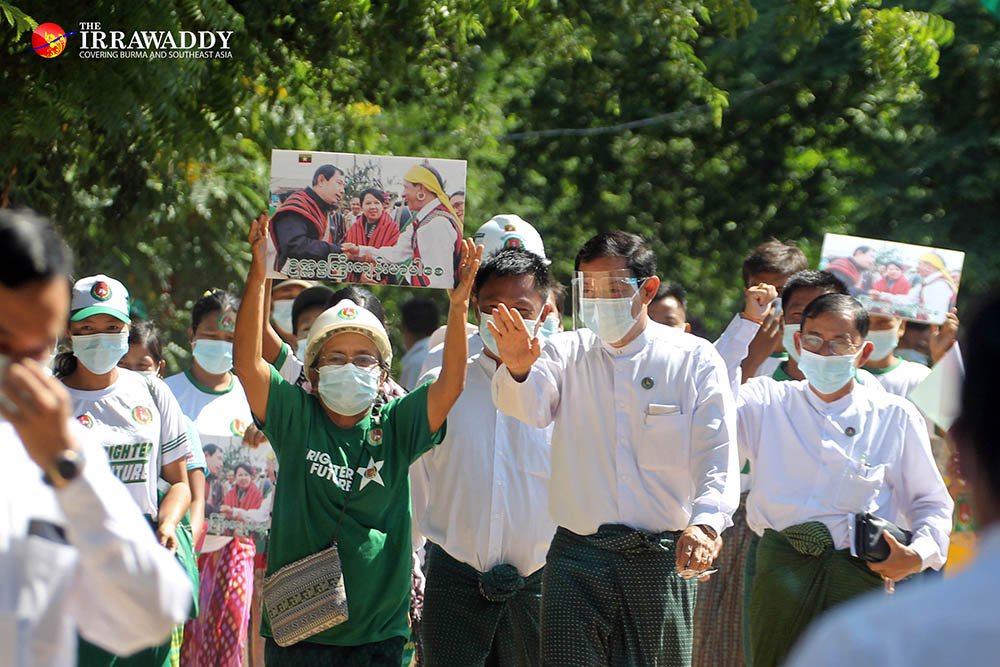
Citing Chapter 13 of the Election Law and Article 364 of the 2008 Constitution, the UEC’s complaint to the press council said it is prohibited to solicit votes by abusing religion and race.
When The Irrawaddy contacted a military spokesman, he declined to comment on the issue.
Then there is the USDP.
The party, whose leadership is largely made up of former senior military officials, came to power after a rigged election in 2010. However, it only managed to win a humiliating 10 percent of seats up for grabs in the 2015 general election, while the NLD won 77 percent. Five years later, the USDP is gearing up to run in nearly all of the approximately 1,119 constituencies in Myanmar in which voting will be held in the upcoming election, going head-to-head with the NLD.
During a campaign event in Naypyitaw’s Zayarthiri Township on Oct. 9, the USDP’s chairman U Than Htay told locals that no one in his family was of mixed blood. The former brigadier general is running for a Lower House seat in the township, which is home to many military institutions including the Office of the Commander-in-Chief of Defense Services.
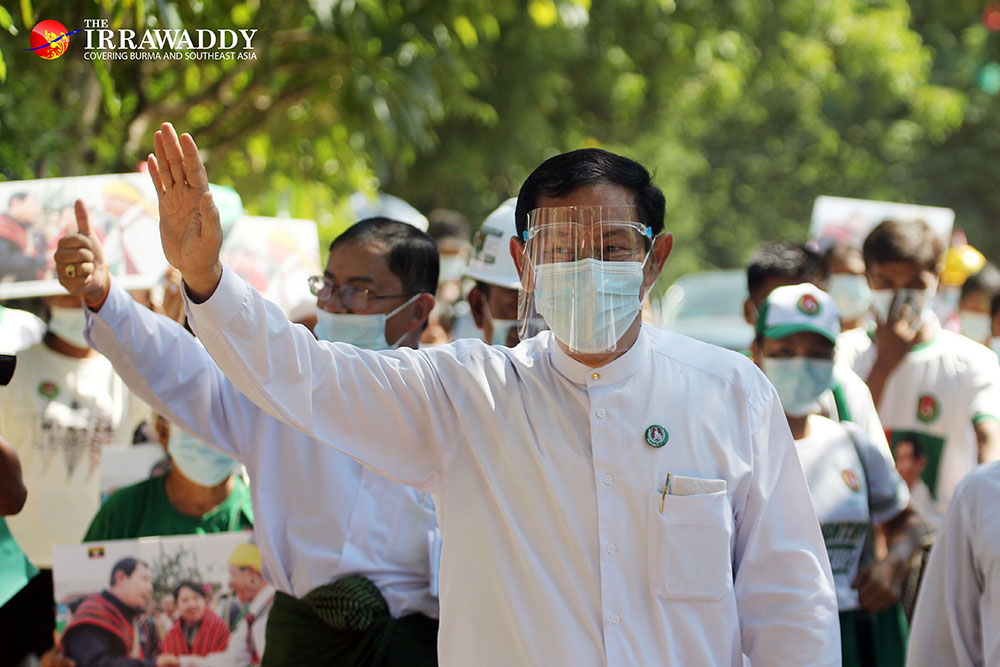
Speaking to a crowd in Thit Ta Kalay Village in Zayarthiri Township, U Than Htay said, “You can check whether my wife and children… What bloodline do they have? Are there any ‘kalar’ [a word opposed by many Muslims as religiously discriminatory] or Chinese in my bloodline, or mixed blood from foreigners?” He assured his audience that there is no foreign connection in his bloodline.
The chairman’s speech was condemned by critics as racist.
The USDP has been campaigning as the party that will assure the perpetuation of the country and preservation of the country’s race and religion. It describes both as currently under threat. When U Than Htay was asked by local media why people should vote for the USDP, he said that being “free from foreign influence” and “standing firmly for national interests” are among his top five reasons.
His subordinates have followed suit.
Early this month, USDP candidate U Maung Myint falsely claimed while campaigning in his constituency in Min Kin Township that the NLD has put forward 42 Muslim candidates for office in this year’s election.
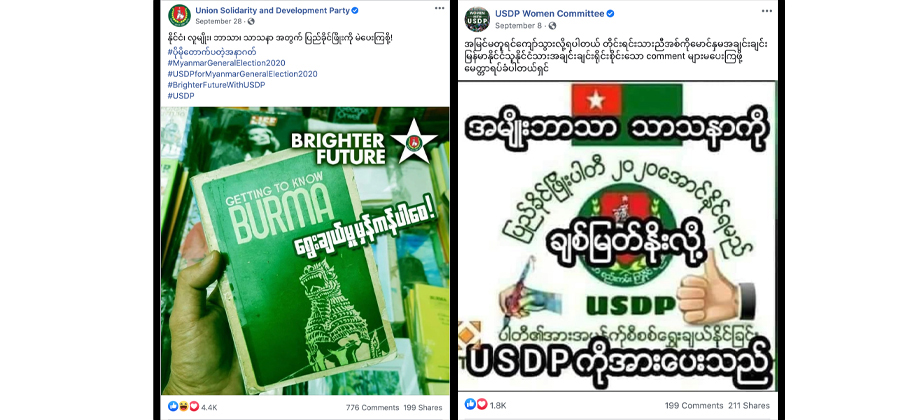
“Just make your own judgment on the party that had three Muslim candidates in 2010 [the USDP] and the other with 42. To be exact, Kalar Sithu Maung in Yangon’s Pabetan Township,” he said, singling out one of the NLD candidates.
“Which side you are on?” he said, referring to the USDP’s inclusion of only three Muslim candidates in 2010.
U Wai Lwin, who served as defense minister in the USDP government from 2011 to March 2016, is now a USDP candidate running for a Lower House seat.
During a recent campaign tour in the constituency in which he is running, Pobbathiri Township in Naypyitaw, he told voters: “Like-minded people will feel that our national identity will become extinct if we continue on the current course. We guarantee that if we win, preserving our national identity will be our first priority.”
Meanwhile, USDP spokesperson U Thein Tun Oo said in an online campaign video that, “We must not lose. Only if we win will our sovereignty be preserved.” His election posters in Mandalay Region’s Amarapura Township state: “Vote USDP and Make Myanmar People Last Forever.”
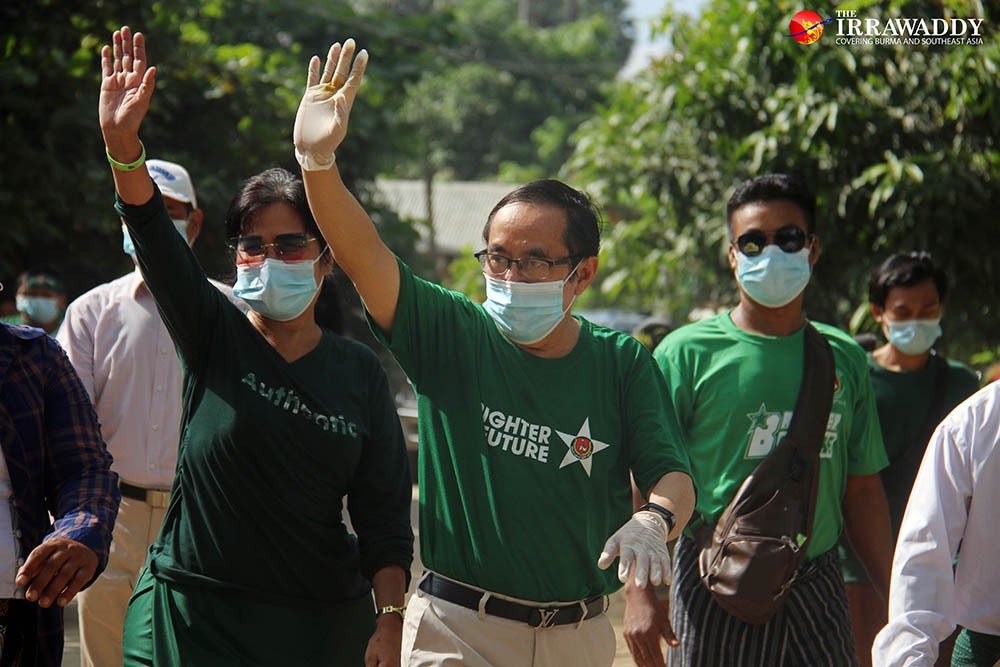
The USDP has always positioned itself as a guardian of race and religion, in line with the country’s ultranationalists, who claim that the foundations of Buddhism are under assault and that Myanmar Buddhists must be vigilant against the influence of “fundamentalist” religions like Islam.
When it came to office after the 2010 general election, the USDP-led government adopted a package of four controversial race and religion laws. The now-defunct Association for the Protection of Race and Religion, better known by the Burmese acronym Ma Ba Tha—the country’s notorious nationalist group— applauded the USDP’s legislation as a success for nationalism.
When the NLD came to power in 2016, it took only three months for the new government to declare Ma Ba Tha an “unlawful association.” Though the announcement drew criticism from nationalists, the association and its lay supporters have since maintained a low profile.
One of the USDP’s spokeswomen, Daw Nan Mya Mya Mie Mie Zaw, wrote on her Facebook page that the country’s majority Buddhists are being insulted under Daw Aung San Suu Kyi’s government and decried the banning of a Buddhist organization, referring to Ma Ba Tha.
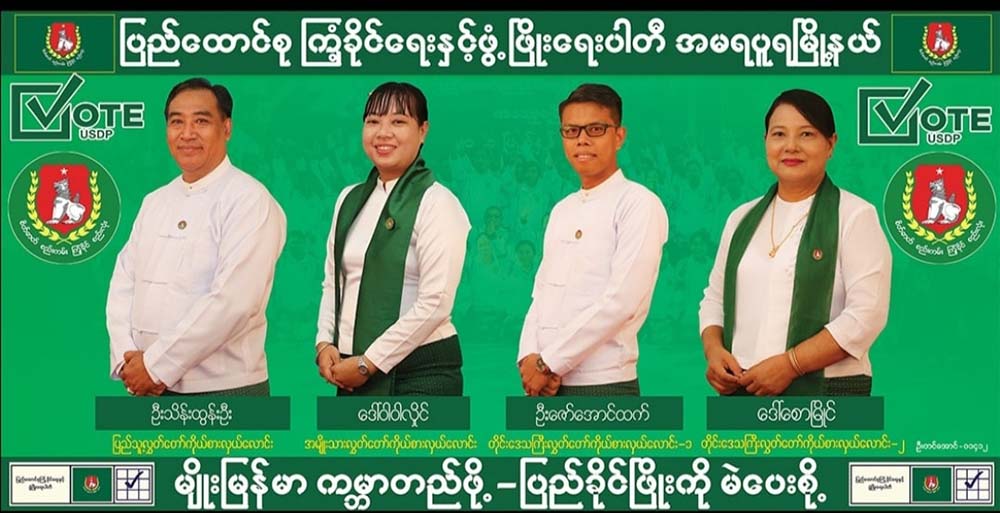
She also defended the party’s use of Buddhist flags during an event on Sept. 16 in Meikhtila Township of Mandalay Region. During the event, USDP campaigners waved Buddhist flags and allegedly drank alcohol and harassed NLD supporters. The NLD regional office has complained to the election sub-commission about the USDP supporters’ behavior.
The spokeswoman claimed on Sept. 19 that the Constitutional ban on the use of religious symbols for political purposes only applies to the party itself, not its supporters.
The party has also long engaged in talk of “territorial loss” and “perpetuation of sovereignty”. Such rhetoric was among the scare tactics it used to mobilize voters ahead of the 2015 general election.
Recycling this approach, U Nyan Win, a former major general who was Bago Region chief minister in the USDP-led administration, wrote on his official Facebook page this week that “the USDP must win in defense of the territory and nation.”
“Do you want to run your own country? Do you want to be intruded upon by foreigners? Do you want to give up territory easily or do you want to defend it and not lose it? Do you want to have a new race?” he said. “We’d like to request that you vote for our candidates, true patriots who have the ability to protect the country’s sovereignty and territory.”
The same tactic was also put to use by the party’s candidates in Pyay Township of Bago Region and Chauk Township of Magwe Region during campaign events this month. At the events, the candidates in their respective townships told the locals that the NLD had hired more than 90 foreign experts to help guide the spending of public funds.
“If the public gives us a mandate again, we won’t use foreign experts. We will operate with only local experts,” said USDP candidate Daw Khin Shwe Myint, who is running for an Upper House seat in Pyay.
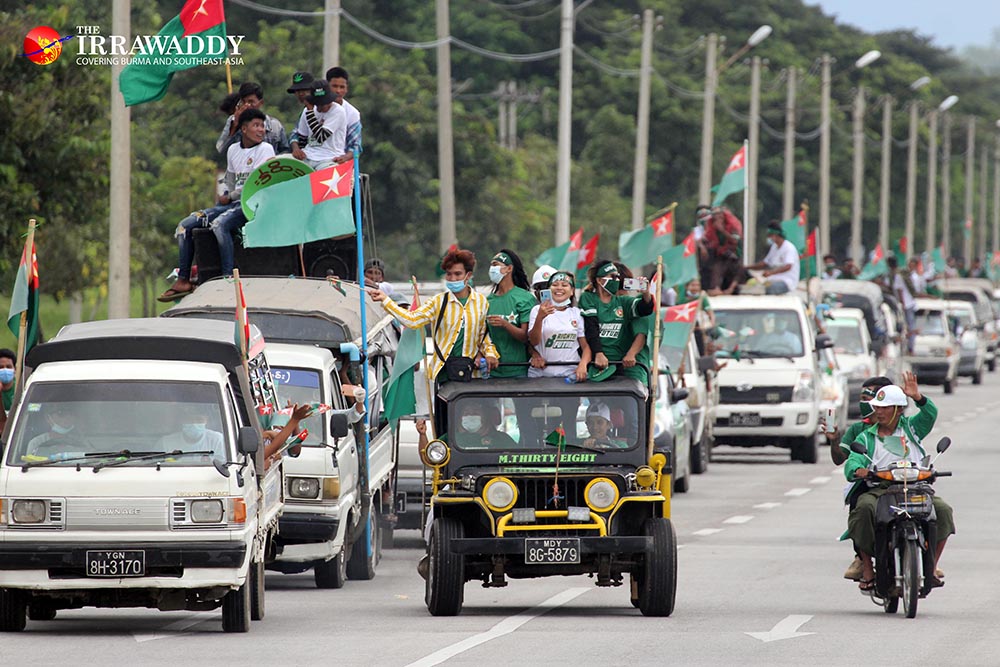
USDP spokesperson U Nandar Hla Myint insisted to The Irrawaddy on Thursday that the party’s candidates don’t use religion in an attempt to attract votes because they are aware that it is a breach of electoral laws.
Asked about some of the senior party members’ use of religion, the spokesperson denied that was the case.
“The senior officials have also instructed the party candidates’ in ethics. So, it’s impossible [that they used religion during their campaign]. I myself as a candidate don’t use it either,” he said.
“However, it’s taken for granted that every citizen has a responsibility to protect and preserve their nation, race and religion. You don’t need to say that out loud,” he added.
During a press conference on Tuesday, UEC member U Myint Naing reminded all political parties and candidates that the use of race and religion while campaigning is a breach of election law and could even lead to the rescinding of an election victory if an opposing candidate filed a complaint.
You may also like these stories:
Myanmar’s NLD Calls for Release of Three Candidates Abducted by AA in Rakhine
Myanmar’s Election Commission Defends Choice of No-Vote Areas After Criticism
Myanmar’s Election Body Confesses Sloppy Checks on Disgraced Party Leader

















